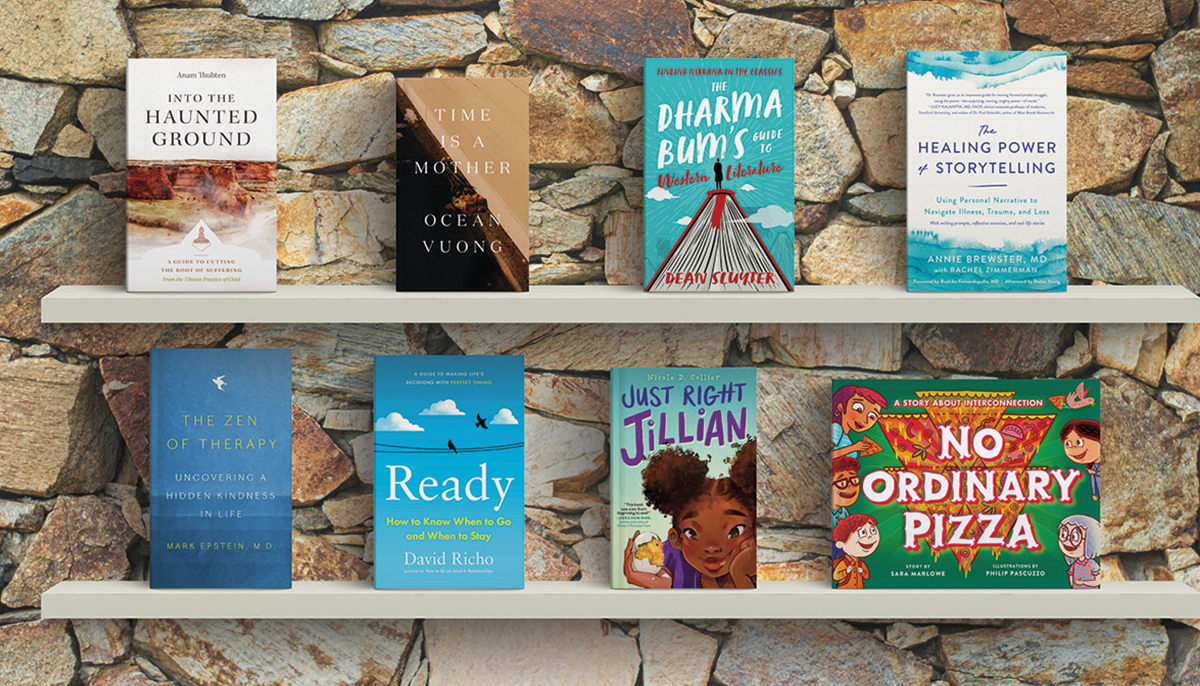Into the Haunted Ground (Shambhala) is a startling and wonderful foray into chöd, an ancient Tibetan meditation practice. Chöd requires the practitioner to willingly enter “haunted grounds”—literal cemeteries, the open wild where animals roam freely, and the shadowed aspects of one’s consciousness, to name just a few examples. There, they face and engage deeply with “demons,” i.e., all that is difficult and painful. Anam Thubten was born and raised in Tibet and is now a teacher in the Nyingma tradition of Tibetan Buddhism in California. He details his own early childhood fascination with chöd, how it followed him into adulthood, and what was revealed to him when he entered the haunted grounds of Canyon de Chelly in Arizona and fully and formally engaged in the practice. There, his ventures into the solitude of burial grounds and haunted, wild places brought him into close and profound relationship with the indigenous communities of the American Southwest. Thubten’s pages are accessible for both beginner and advanced meditation practitioners.
Ocean Vuong, a student of Thich Nhat Hanh, is the award-winning author of the novel On Earth We’re Briefly Gorgeous. Now, in his much-anticipated new collection of poetry, Time Is a Mother (Penguin), he explores his grief after his mother’s death. Vuong brings the reader into ordinary, daily moments—being pulled into memories, drinks with friends, and even tooth-brushing—as he spirals around slippery, unresolvable questions of identity and loss. Vuong is experimental with language and form even as he nimbly maintains a conversational, deeply intimate invitation into his innermost thoughts.
The Dharma Bum’s Guide to Western Literature (New World) is a sparkling, fast-moving reflection on the spiritual truths in some of the great literary works of the English language. Dean Sluyter, a longtime teacher of both American literature and meditation, boldly espouses universals and is unapologetic in heavily representing a canon mostly of “dead white males,” including, for example, the increasingly contentious Hemingway and Dr. Seuss. In places deeply reverent for Sluyter’s own beloved high school teacher (who taught him to explicate a poem by “taking off [his] shoes and run[ning] through it”), and in other places breezy, witty, and brusque, The Dharma Bum’s Guide to Western Literature brings fresh, provocative energy to the classics. This one is worth talking about among book-loving friends and would be a good choice for your book club.
By now, most of us know that people don’t tend to change their lives or behaviors because of data and science—they change their lives based on stories they hear, see, and tell themselves and others. Harvard-trained physician Annie Brewster is interested in what this means for the medical field and for patients who can use storytelling to take control of their lives in the face of major, life-changing diagnoses. Having herself been diagnosed with multiple sclerosis, Brewster knows first-hand that narrating one’s experience with health challenges and trauma is hard work. It requires deep digging, sitting with pain and sadness, and has no clear finish line. So in The Healing Power of Storytelling (North Atlantic), she supports her readers in their process by incorporating memoir, patients’ stories, writing prompts, and step-by-step instructions. Working through this book, readers will improve wellness, strengthen relationships, and integrate difficult experiences into a new understanding of identity and purpose.
Mark Epstein, a well-known American author and Harvard educated psychiatrist, takes up the interface of Buddhism and psychotherapy in The Zen of Therapy (Penguin). Boldly deciding to no longer “keep separate” his Buddhist training from his psychotherapy practice, Epstein slowly discovers how much many of his patients want mindfulness training to be incorporated into their therapy work. While protecting his clients’ privacy, Epstein details as closely as possible just what this looks like on the ground. He uses his own personal and professional experience to investigate how Western therapy can be considered “two-person meditation,” and what this means for the psychotherapist and the client. Epstein emphasizes meditation not as a solitary endeavor or practice, but an interpersonal practice in which the client brings their real-life issues into awareness as “grist for the spiritual mill,” and the therapist—as a spiritual friend—helps make it possible.
In Ready (Shambhala), David Richo, a psychotherapist for more than fifty years, asks us: What does it mean to be ready to make a change? How do we know it’s time, how can we trust ourselves, and how can we begin? Why does anyone stay too long in something/someplace that no longer “works”? We may be under the spell of our own childhood, says Richo, or paralyzed by fear, or caught in addiction or codependency. And yet we know, on some level, that we’re stuck and have to move. Based on decades guiding patients, as well as on his own struggles with these sometimes-mystifying patterns and questions, Richo breaks down how we can find the language for our hunch that something needs to change, and then—guided by writing, reflection, and meditative exercises—honor where we’ve been and decide with clarity and visceral confidence how to move forward.
Nicole D. Collier, PhD, is a Soka Gakkai practitioner and former elementary school teacher who has written her first novel, about a girl who finds her voice. Just Right Jillian (Versify) is an empowering story for middle-grade readers, especially those who, like Jillian, have a Foe (with a capital F!). It’s also for anyone who tries to blend in and keep quiet, even when it’s wrong or personally detrimental to do so. With the support of family and friends, and over a rather rocky road, Jillian must learn to position herself in the world with the kind of confidence and guts that only arise when—shaky and scared—you take a first step anyway. As seems the case with any story of transformation and growth, Jillian’s courage both grows out of and feeds the important relationships she’s committed to tending and the vows she promises to keep.
Author Sara Marlowe—a clinical social worker and mindful self-compassion teacher—and illustrator Philip Pascuzzo pair up for their second picture book on mindful eating for kids ages four to ten. May each and every one of us eat pizza like the children in No Ordinary Pizza (Wisdom)! These young friends use all of their senses and observational powers until their homemade pizza becomes “their whole, entire universe.” Then, after they’ve eaten the pizza, they begin to examine the thousands of people and actions that went into every bite—the farmers, the sunshine, the soil, the water, the tomatoes, the transport trucks. Because there are so many, many people, plants, and animals involved in the production of this veggie pizza, they are awestruck to realize that when they eat it, they’re eating it with the entire planet. Pizza never tasted so good!

